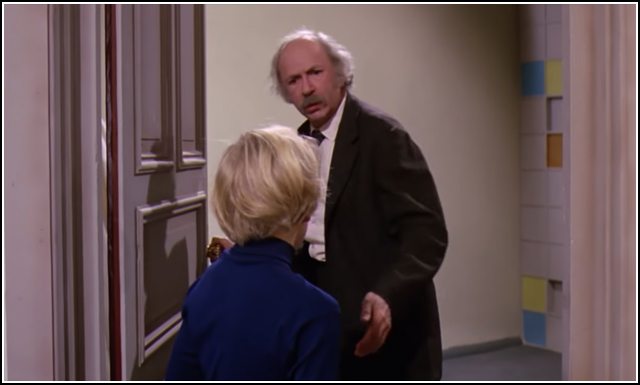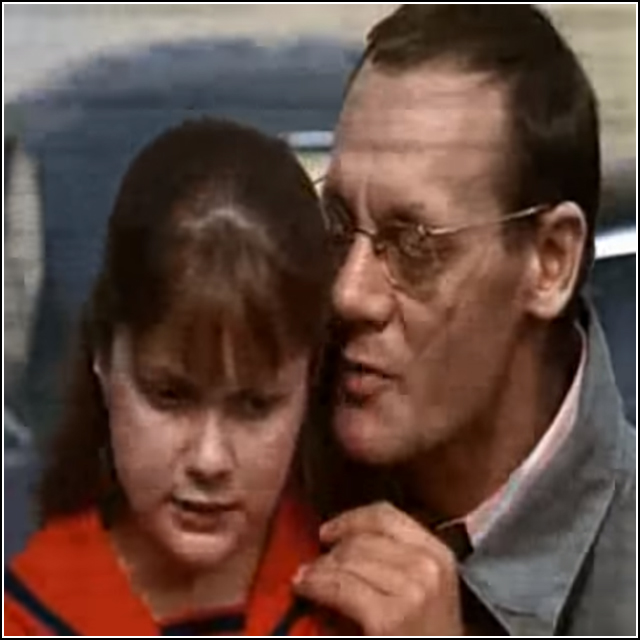
One of my favorite writers shared something from Tumblr today that definitely inspired some thought: Violet Beauregarde should have won Wonka's Chocolate factory.
I urge you, if you're a fan, to go read Evayna's take on Violet. It's tremendous fun. (Caution: this article contains spoilers for WILLY WONKA AND THE CHOCOLATE FACTORY, so if you're rushing in having never seen the film, wait... stop... don't... turn back.)
WILLY WONKA AND THE CHOCOLATE FACTORY happens to be my favorite film of all time. I have long recommended it to people with stress in their life. When I was in a particularly stressful place in my life, I would put it on, and the way Wonka let every stupid thing said to him slide right off his back and out the window was enormously relaxing. (Yes, I know Tim Burton's CHARLIE AND THE CHOCOLATE FACTORY is closer to what Dahl intended; no, I do not factor that version of the story in this discussion at all, or the book, for that matter.)
So I read Evayna's post, but not just as a fan of the Gene Wilder version (the Good version), but as a film critic who can honestly look at some of the problems not only in the Roald Dahl book, but to admit to some hard truths about the Good version. Dahl wrote Wonka as a capitalist, colonialist trickster with money enough not to need the approval of others. Wilder's version is that, but it also skirts around the darker parts of him, because, hey, it's a musical about winning free candy.
I am always surprised more people don't pick up on this fact: Wonka's game is clearly rigged.
When explaining the contest to Charlie, Wonka specifically states that the contest was designed to find children, to find a child he could mold into doing it HIS way. Everywhere a winning ticket is, Mr. Wilkinson, the scar-faced man impersonating Slugworth, just happens to be (except Argentina, where the Nazi war criminal tries to pass off the false ticket). At a time when adults are holding each other hostage for Wonka bars, the bars are landing in the hands of the children. I took it to mean that Wilkinson must be manipulating events to make certain that the bars land in the hands of kids, not adults. And once the ticket is uncovered, he is positioned nearby.
In Charlie's case, he just happens to know the route Charlie will take home to his family, and intercepts him there to make the Slugworth offer known. This suggests that Wilkinson didn't just know Charlie would win the ticket, but that he may have had a hand in getting the ticket into Charlie's hands.
None of the shenanigans the kids got up to in the factory was the deal-breaker Wonka pretended they were. They were actually carefully-laid traps, specific to each child... not to exclude the kids from the prize, but to test whether they would betray their promise about the Gobstopper once they lost the lifetime of free chocolate. The real test Wonka has planned for the kids is the Gobstopper, and not their behavior in the factory. Because Wonka knows that kids will be kids and get into trouble. As a matter of fact, he's counting on it.
Skeptical? Remember that Wonka welcomes Augustus to a river of chocolate... he shows off a unique gum experience to Violet... he shows Charlie (the kid who has never been anywhere) flying tonics and then walks away... shows off a rare goose to Veruca... puts Mike in range of a unique t.v. experience... these are traps, specific to each kid... tailored to them, in fact.
And the parents/guardians all bear responsibility, too. Mrs. Gloop fails to be firm with Augustus before he falls in the choco-river... Mr. Beauregard encourages Violet to try the dangerous gum... Grandpa Joe holds Charlie back to sneak a drink of Fizzy-Lifting... Mr. Salt placates and mollifies his spoilt daughter... Mrs. Teevee has zero ability to stop Mike from his impulses.
And after reading her thoughts on Violet's worthiness, I can only conclude that, well, I think she's wrong... but, then again, there is no snap answer to this. She has pointed out that Violet represents many virtues, and she is correct. She also overlooks some of her fatal weaknesses and is a little unfair to the other kids in the contest-- particularly to Charlie. Reminder: for the sake of this discussion, I am going to avoid referencing Book or Burton characters and stick to the Good Version.
Most of the comments made about Violet are correct. She has a freakin' Guinness World Record, for goodness sake. She is accomplished, goal-driven, and has an intense interest in gum-chewing. The one issue to contend with is, will Violet sell her Everlasting Gobstopper and sell out Wonka? Some of the things she says when interviewed for t.v. suggest that she is that spiteful. Her taunting of a schoolmate over the world record for a single gum chewing doesn't speak well of her.
Since we're reviewing kids and their banishment from Wonka's factory, I would like to speak up for two more kids: Augustus Gloop and Mike Teevee.
Augustus Gloop's big crime is supposedly scooping chocolate out of the river Wonka had clearly just given him free access to. Wonka literally opened his arms to this edible environment and showed them all in, without one word of "But stay away from my chocolate river, please." How can anyone blame the kid for taking a sip of the chocolate river? (and a slow play of the film suggests that Wonka just about pushes him in.)
Augustus' real crime? Well, he's fat, with a big appetite. His Oompa-Loompa song confirms this. I don't know that he or his mother would sell, they actually seem very ethical to me... but given that they are German, it might have been interesting for them to consider selling to the false Slugworth solely on the rationale that someone else will sell instead.
Teevee is a loud, annoying, American caricature... but there he is. His mother is more the problem where he's concerned; she would sell Wonka out in a heartbeat, and probably did try to sue him for what happened to little Mikey (albeit unsuccessfully). Mike doesn't seem like the kind of kid who would do wrong things just for the hell of it or out of greedy motivations; most of Mike's trouble comes from a lack of parental good sense, not a lack of guidance itself. An impatient pleasure-seeker who doesn't understand consequence.
(Veruca Salt is just not worth discussion. We see the depths to which Mr. Salt goes with her, and she's just purely evil with no redeeming qualities. Fight Me.)
As for Charlie... yes, Charlie does do a bad thing, and it's worse than what Augustus does, for certain. He steals Fizzy Lifting Drink, because his rascal of a Grandpa Joe encourages him to do it. And he nearly dies from doing it. It's part of his hero's journey, that he begins to see that his Grandpa Joe isn't quite the kind of man Charlie wants to be. And unlike the other kids, Wonka/Oompas doesn't save Charlie from this mess; he gets himself out of the situation and seems to learn his lesson from the incident. More on that in a moment.
Although I agree that Charlie's crime is no worse than what anyone else does... even Veruca isn't really all that horrible in terms of damage done to the factory... Dahl's moral is not about these sins. It's about loyalty in the face of disappointment... keeping one's word when there's nothing to be gained further.... and overcoming bad parenting to be a better human being than the folks who raised you.
The moment that Charlie wins the factory isn't when he hands over the Everlasting Gobstopper to Wonka... it's when his Grandpa Joe leads him out of the factory, muttering his intentions to get even, and Charlie breaks with him, to become the hero at last.

We've seen Charlie's poverty, the way his family has been living (and Joe, mate, you're really taking the piss in going on this pleasure cruise after a decade of being laid up in bed and being waited on hand and foot by your long-suffering daughter and grandson), and we have some idea what Wilkinson/Slugworth's promise of money could do for that family. Charlie does not surrender to his grandfather's corruption. Whereas Violet...

I always took this sudden announcement of Charlie winning to mean that none of the other kids had stepped forward and admitted to having contact with Slugworth (which is implied in Charlie leaving the Gobstopper on Wonka's desk), making Charlie the first-place winner. Perhaps any, or all of the other kids could have won the contest, if they had only overcome the terrible tutelage of their parents, and laid down their own Gobstoppers. Wonka called out Wilkinson because the game was won and Charlie had done what the other kids could not or did not do: stand up to their awful parents and do what they knew to be right.
All that being said, I think there's room for Evayna's ideas in people's headcanon for Violet being an asset to Charlie Wonka. I like the idea of an adult Charlie hiring on Violet as a gum developer with a huge focus on product safety.
I can imagine him hiring a slimmed-down Augustus as a chocolate engineer who's trying to overcome a childhood fear of sweets, given to him by Wonka's scary factory. And I can see Charlie hiring on an adult Mike Teevee as a commercial maker.
In short, I can see Charlie Bucket doing what he did in WILLY WONKA AND THE CHOCOLATE FACTORY: stepping out of the bad parenting going on around him (Wonka) and doing the right thing (fulfilling the promises that Wonka tricked the other kids out of). That's my headcanon.
-- Precious Roy

